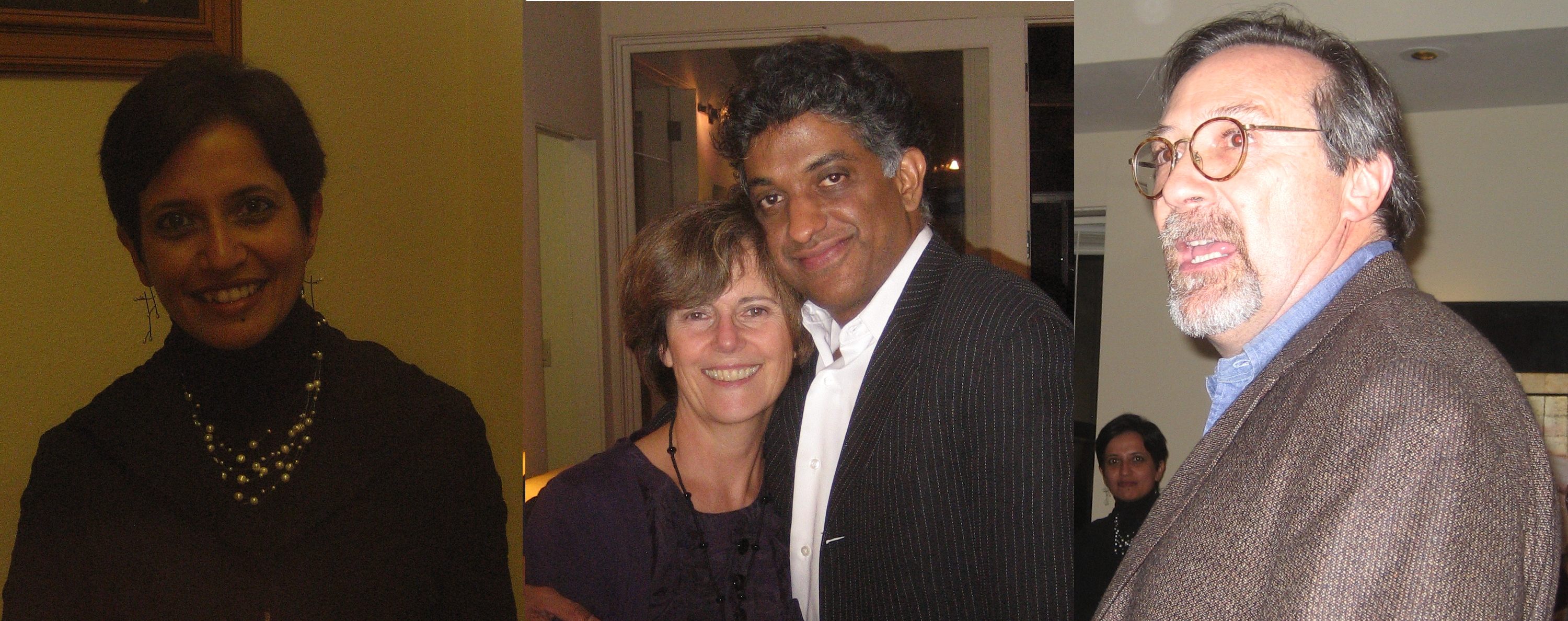
Sramana Mitra (left) presented her book at the invitation of T.M. Ravi (center, with his wife Francine) and Patrick Consorti (right).
When you start a book, there are always a few words that make you want to read on. I like the way Sramana Mitra describes her goal with “Entrepreneur Journeys.” She wants “to capture that tribal knowledge accumulated in the private lives of great entrepreneurs.” Although it is now common lingo, even with Six Sigma pundits, I still love the notion of “tribal knowledge.” While it is true that nothing completely new can be said about how to build a company, there will never be enough books recounting the actual experience of entrepreneurs. Yes, it is hard and challenging, but there are entrepreneurs starting companies everyday, because, as Sramana says, being an entrepreneur is “more than a career, it is a way of life.”
Sramana interviews twelve entrepreneurs, whom she presents through five sections:
- Bootstrapping
- Taking on Giants
- Disrupting Business Models
- Addressing Unmet Market Needs
- Tackling Planet Scale Problems
Her choices are excellent. She does not tell us for the umpteenth time the epic tale of the legendary heroes haunting our California shores, but rather focuses on the occasionally complex rides of sometimes lesser known, yet highly successful entrepreneurs.
Sramana starts with two bootstrappers. Still quite a legitimate breed of people, maybe even more so these days. Some people love to take tough paths, for various reasons, at least during the foundational years of the company. The phenomenal success of Jerry Rawls, co-founder and CEO of Finisar, a leader in optical components or the pragmatic nimbleness of Sridhar Vembu, founder and CEO of AdventNet (and creator of the productivity suite Zoho) are equally inspiring. They chose routes that VCs generally do not like, such as starting products through consulting or operating on mixed business models; key to their success is a survival instinct and the intimate conviction that failing is not an option.
The founders of VC-backed companies selected by Sramana, are not less gutsy, though. In addition to a shrewd Web 3.0-type approach, the strength of Steve Hafner from Kayak is an unwavering common sense: “Build a great technology, syndicate that out to other affiliates like AOL, who already have an audience and then keep innovating on the product to make folks come back to you directly” – and also keep your eyes on the right ratios, especially if you aim at “taking on giants.” The same reasonableness (I would even speak of “serial reasonableness”) is key to the various successes of Gautam Godhwani (founder of ArtWeb, the India Community Center, and, more recently, SimplyHired) and of Russ Fradin, founder of Adify, recently acquired by Cox.
They all disturb the world order in a way, but all are as level-headed as they are undaunted and venturesome. This is the reason behind the growth of Qualys, the company of Philippe Courtot, who has the indomitable energy of a legionnaire. Incidentally, they must also be able to reconsider their entire business model to continue to make a difference, hence the extraordinary recovery of Steve Singh’s Concur: “You must confront the issues that exist in your business as soon as humanly possible, and solve them,” Singh comments.
What comes out of most of Sramana’s interviews is the solid determination of all of these companies’ founders, as well as their courage through the ups or downs or challenges. The very existence of Marcos Galparin’s MercadoLibre is somewhat of an exploit. Finding money for HotChalk, the first free online community to connect pre K-12 teachers, students and parents did require from Edward Fields the resolution of a missionary. To put it mildly, Energy Recovery Incorporated may never be an easy ride for Hans Peter Michelet, no matter how many accolades he keeps on receiving. Yet, and although, Carol Realini from Obopay admits that “big ideas are very hard to fund,” she did find money. The final word belongs to Harish Hande, the social entrepreneur of Selco, which provides reliable energy service in rural areas in India: ” There is no short cut to creating good processes.”
Conclusion: Read this book. Sramana is a remarkable interviewer, both knowledgeable and very smooth. She introduces you to real people, with real businesses and offers you a genuine perspective of what it’s like to be a entrepreneur. You may know some of it if you are already one, yet it does not hurt to listen to other people to better/further analyze one’s personal experience.
BTW – This book is Volume 1. I will keep you posted when Volume 2 is out!
Marylene Delbourg-Delphis


4 responses so far ↓
1 Patrick Consorti // Nov 8, 2008 at 5:02 am
Sramana is a fantastic advocate for entrepreneurship and reposition the art in today’s context beautifully. Marylene’s review is very insightful and enlighten these great stories with subtile contrasts.
Renaissance ladies on the rise.
2 Marylene Delbourg-Delphis Reviews EJ1 - Sramana Mitra on Strategy // Nov 8, 2008 at 5:30 am
[…] Entrepreneurship at Ravi and Francine’s home last night. Marylene Delbourg-Delphis has a review of EJ1 on her blog along with some pictures from the party. Marylene herself is an entrepreneur. More, she has […]
3 Marketing Entrepreneur Journeys - Sramana Mitra on Strategy // Dec 17, 2008 at 8:01 pm
[…] to see if their style speaks to you: Ivana Taylor, Alan Brochstein, Chris Brown, Brajeshwar, Marylene Delbourg-Delphis, Frank Lara, Ken Ross, Steve King and Thomas […]
4 How to test, validate, and bring your idea to market, by Sramana Mitra // Sep 19, 2009 at 7:11 pm
[…] http://delbourg-delphis.com/2008/11/sramana-mitra-entrepreneur-journeys/ […]
Leave a Comment